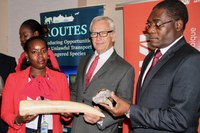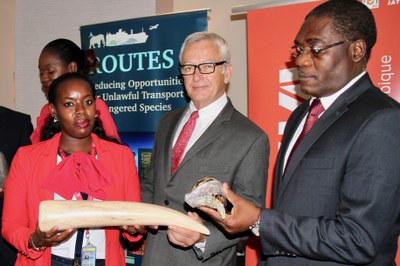LAM To Help Curb Wildlife Trafficking in Mozambique
Feb 27, 2018
According to a recent ROUTES report analyzing wildlife trafficking in the air transport sector, Mozambique serves as a hotspot for poachers and traffickers supplying wildlife products to Asia, particularly ivory and rhino horn. “Wildlife trafficking is a transportation-intensive activity and smugglers carrying illegal wildlife and wildlife products need to interact with airport and airline staff at multiple points during the journey,” said Michelle Owen, ROUTES Lead. “Increasing the ability of staff to identify and report suspicious activities linked to wildlife trafficking is crucial for stopping traffickers that abuse the transport sector.”
As the elephant population in Mozambique continues to suffer huge losses to poachers, many in the transportation sector are recognizing the need to take action. “Airline staff spend more time with passengers, their baggage, and cargo shipments than customs officers,” says Jon Godson, IATA’s Assistant Director, Aviation Environment. “They can provide a key source of intelligence for the enforcement agencies.”
The USAID ROUTES workshop ensures that airport and airline staff recognizes common wildlife trafficking techniques and are equipped with the materials and resources to help protect Mozambique’s natural heritage from smugglers and traffickers.
The training in Maputo was the first in a series of training workshops that ROUTES will be conducting for airport and airline staff this year at key wildlife trafficking hubs across Africa. Over the next few months, ROUTES will hold training sessions in Kenya, Uganda, Malawi, and Ethiopia.
###
About ROUTES
The USAID Reducing Opportunities for Unlawful Transport of Endangered Species (ROUTES) Partnership brings together government agencies, transportation and logistics industry companies and representatives, international conservation, development and law enforcement organizations and donors in order to disrupt wildlife trafficking activities, and forms a key element of the concerted international response to addressing wildlife poaching and associated criminal activities worldwide.
At the heart of ROUTES is a core group of partners collaborating with the U.S. Government and the transport sector that includes the Center for Advanced Defense Studies (C4ADS), Freeland, the International Air Transport Association (IATA), TRAFFIC and WWF. The Partnership is funded by USAID and coordinated by TRAFFIC. To learn more, visit routespartnership.org or follow @ROUTESPartners
About USAID
The United States Agency for International Development (USAID) leads the U.S. Government’s foreign assistance efforts. In Mozambique, USAID works in the areas of health, primary education, economic growth and governance. For more information please visit usaid.gov/mozambique or follow @USAIDMozambique on Facebook and Twitter.
About TRAFFIC
TRAFFIC, the wildlife trade monitoring network, is the leading non-governmental organization working globally on trade in wild animals and plants in the context of both biodiversity conservation and sustainable development. For more information, visit traffic.org or follow @TRAFFIC_WLTrade
About IATA
IATA represents some 280 airlines comprising 83% of global air traffic. For more information, visit IATA.org or follow@IATA2press


